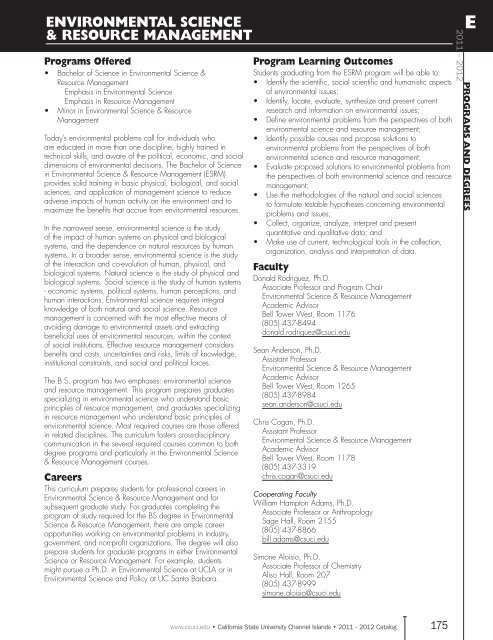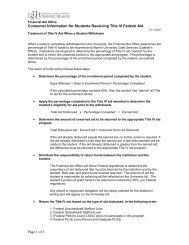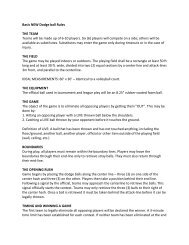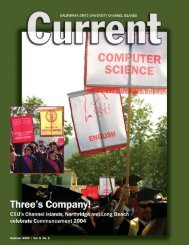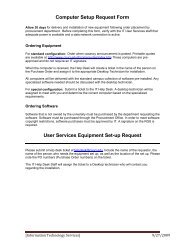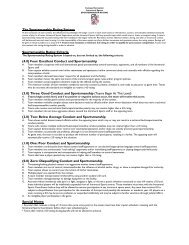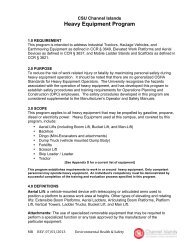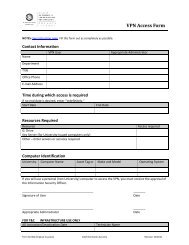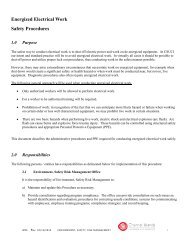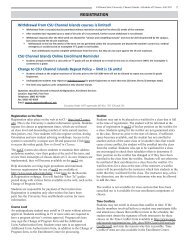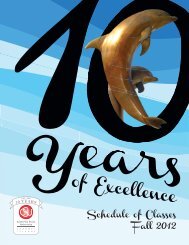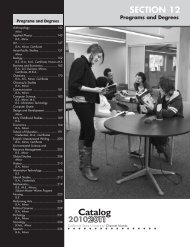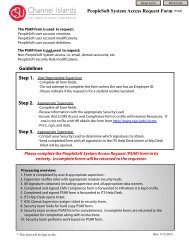Download printable catalog - CSU Channel Islands
Download printable catalog - CSU Channel Islands
Download printable catalog - CSU Channel Islands
Create successful ePaper yourself
Turn your PDF publications into a flip-book with our unique Google optimized e-Paper software.
ENVIRONMENTAL SCIENCE& RESOURCE MANAGEMENTPrograms Offered• Bachelor of Science in Environmental Science &Resource ManagementEmphasis in Environmental ScienceEmphasis in Resource Management• Minor in Environmental Science & ResourceManagementToday’s environmental problems call for individuals whoare educated in more than one discipline, highly trained intechnical skills, and aware of the political, economic, and socialdimensions of environmental decisions. The Bachelor of Sciencein Environmental Science & Resource Management (ESRM)provides solid training in basic physical, biological, and socialsciences, and application of management science to reduceadverse impacts of human activity on the environment and tomaximize the benefits that accrue from environmental resources.In the narrowest sense, environmental science is the studyof the impact of human systems on physical and biologicalsystems, and the dependence on natural resources by humansystems. In a broader sense, environmental science is the studyof the interaction and co-evolution of human, physical, andbiological systems. Natural science is the study of physical andbiological systems. Social science is the study of human systems- economic systems, political systems, human perceptions, andhuman interactions. Environmental science requires integralknowledge of both natural and social science. Resourcemanagement is concerned with the most effective means ofavoiding damage to environmental assets and extractingbeneficial uses of environmental resources, within the contextof social institutions. Effective resource management considersbenefits and costs, uncertainties and risks, limits of knowledge,institutional constraints, and social and political forces.The B.S. program has two emphases: environmental scienceand resource management. This program prepares graduatesspecializing in environmental science who understand basicprinciples of resource management, and graduates specializingin resource management who understand basic principles ofenvironmental science. Most required courses are those offeredin related disciplines. The curriculum fosters cross-disciplinarycommunication in the several required courses common to bothdegree programs and particularly in the Environmental Science& Resource Management courses.CareersThis curriculum prepares students for professional careers inEnvironmental Science & Resource Management and forsubsequent graduate study. For graduates completing theprogram of study required for the BS degree in EnvironmentalScience & Resource Management, there are ample careeropportunities working on environmental problems in industry,government, and non-profit organizations. The degree will alsoprepare students for graduate programs in either EnvironmentalScience or Resource Management. For example, studentsmight pursue a Ph.D. in Environmental Science at UCLA or inEnvironmental Science and Policy at UC Santa Barbara.Program Learning OutcomesStudents graduating from the ESRM program will be able to:• Identify the scientific, social scientific and humanistic aspectsof environmental issues;• Identify, locate, evaluate, synthesize and present currentresearch and information on environmental issues;• Define environmental problems from the perspectives of bothenvironmental science and resource management;• Identify possible causes and propose solutions toenvironmental problems from the perspectives of bothenvironmental science and resource management;• Evaluate proposed solutions to environmental problems fromthe perspectives of both environmental science and resourcemanagement;• Use the methodologies of the natural and social sciencesto formulate testable hypotheses concerning environmentalproblems and issues;• Collect, organize, analyze, interpret and presentquantitative and qualitative data; and• Make use of current, technological tools in the collection,organization, analysis and interpretation of data.FacultyDonald Rodriguez, Ph.D.Associate Professor and Program ChairEnvironmental Science & Resource ManagementAcademic AdvisorBell Tower West, Room 1176(805) 437-8494donald.rodriguez@csuci.eduSean Anderson, Ph.D.Assistant ProfessorEnvironmental Science & Resource ManagementAcademic AdvisorBell Tower West, Room 1265(805) 437-8984sean.anderson@csuci.eduChris Cogan, Ph.D.Assistant ProfessorEnvironmental Science & Resource ManagementAcademic AdvisorBell Tower West, Room 1178(805) 437-3319chris.cogan@csuci.eduCooperating FacultyWilliam Hampton Adams, Ph.D.Associate Professor or AnthropologySage Hall, Room 2155(805) 437-8866bill.adams@csuci.eduSimone Aloisio, Ph.D.Associate Professor of ChemistryAliso Hall, Room 207(805) 437-8999simone.aloisio@csuci.edu2011 – 2012PROGRAMS AND DEGREESwww.csuci.edu • California State University <strong>Channel</strong> <strong>Islands</strong> • 2011 - 2012 Catalog175


